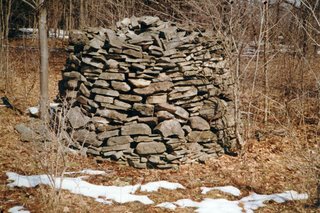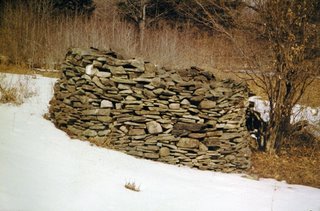Attached are some images of cairns in New York State. The first is the tallest cairrn I have ever seen, either in person or in photos. It is at least 11' tall and is located in the town of Franklin. It reminds me of a tall cairn that was illustrated in an article that Tom Brannan wrote for the NEARA Journal some years ago, in which he proposed that the tall cairns were used as trail and ley line markers. Whatever their explanation, the one in Franklin is very impressive.
 The other two cairns illustrated are no longer. In an article Don Windsor wrote in 2000, titled "Stone Piles in Chenango County" (Archives of the SciAesthetics Institute 2000 Dec; `1(2): 33-50), he wrote the following about a group of cairns near Buckley Hollow along the Finger Lakes Trail south of Oxford, NY. Underneath the bold heading THESE PILES HAVE BEEN DESTROYED!! on page 36, he writes: "On Tuesday 22 August 2000, I received a phone call from Ed Sidote telling me that Rufus Perkins reported that these large stone piles were taken apart and sold for stone. Delayed by a trip to Florida, I photographed the remains on Thursday 31 August. At that time the 4 cylindrical piles were just a rubble of unmarketable stones. The large triangular center pile was still intact. It probably is gone by now. That same morning George Kolb spotted a pallet of stones on the side of Winner Road, east of the site. Not only were the piles gone, but the impressive stone fences nearby had been taken also.
The other two cairns illustrated are no longer. In an article Don Windsor wrote in 2000, titled "Stone Piles in Chenango County" (Archives of the SciAesthetics Institute 2000 Dec; `1(2): 33-50), he wrote the following about a group of cairns near Buckley Hollow along the Finger Lakes Trail south of Oxford, NY. Underneath the bold heading THESE PILES HAVE BEEN DESTROYED!! on page 36, he writes: "On Tuesday 22 August 2000, I received a phone call from Ed Sidote telling me that Rufus Perkins reported that these large stone piles were taken apart and sold for stone. Delayed by a trip to Florida, I photographed the remains on Thursday 31 August. At that time the 4 cylindrical piles were just a rubble of unmarketable stones. The large triangular center pile was still intact. It probably is gone by now. That same morning George Kolb spotted a pallet of stones on the side of Winner Road, east of the site. Not only were the piles gone, but the impressive stone fences nearby had been taken also. "This loss is an incredible blow to our local heritage. The landowner apparently values money over all else. However, those piles would have been worth much more intact. What was done was similar to chopping up an antique table and selling it for firewood.
"Nevertheless, here are descriptions of what they were. A photo of the southernmost pile appears in Figure 4. The 5 piles here were laid out in a circular arc, spaced at 68, 68, 120, and 77 feet apart. The largest pile is triangular, unlike the cylindrical two on each of its flanks. Its apex points easterly toward the imaginary center of the arc's circle. The view extends to the hills about 4 miles across the Chenango River valley."
 [Note from PWAX. It is clear what kind of legislation rock pile enthusiasts should be working towards - whether town, state, or federal: A variance should be required to move any stonework that pre-existed the current landowners tenure.]
[Note from PWAX. It is clear what kind of legislation rock pile enthusiasts should be working towards - whether town, state, or federal: A variance should be required to move any stonework that pre-existed the current landowners tenure.]

 [Note from PWAX. It is clear what kind of legislation rock pile enthusiasts should be working towards - whether town, state, or federal: A variance should be required to move any stonework that pre-existed the current landowners tenure.]
[Note from PWAX. It is clear what kind of legislation rock pile enthusiasts should be working towards - whether town, state, or federal: A variance should be required to move any stonework that pre-existed the current landowners tenure.]
No comments :
Post a Comment